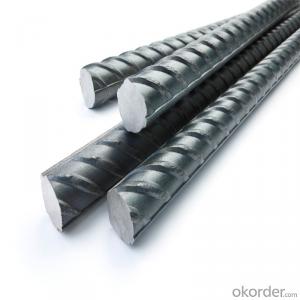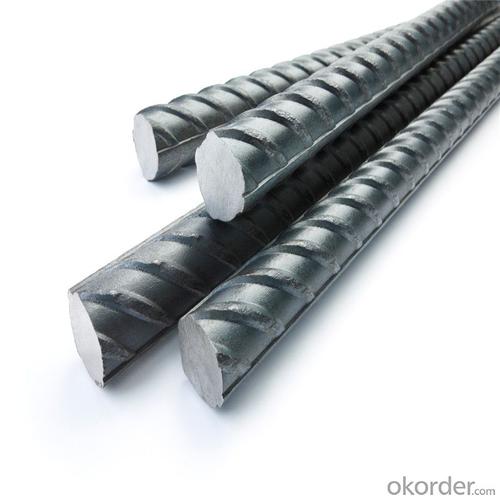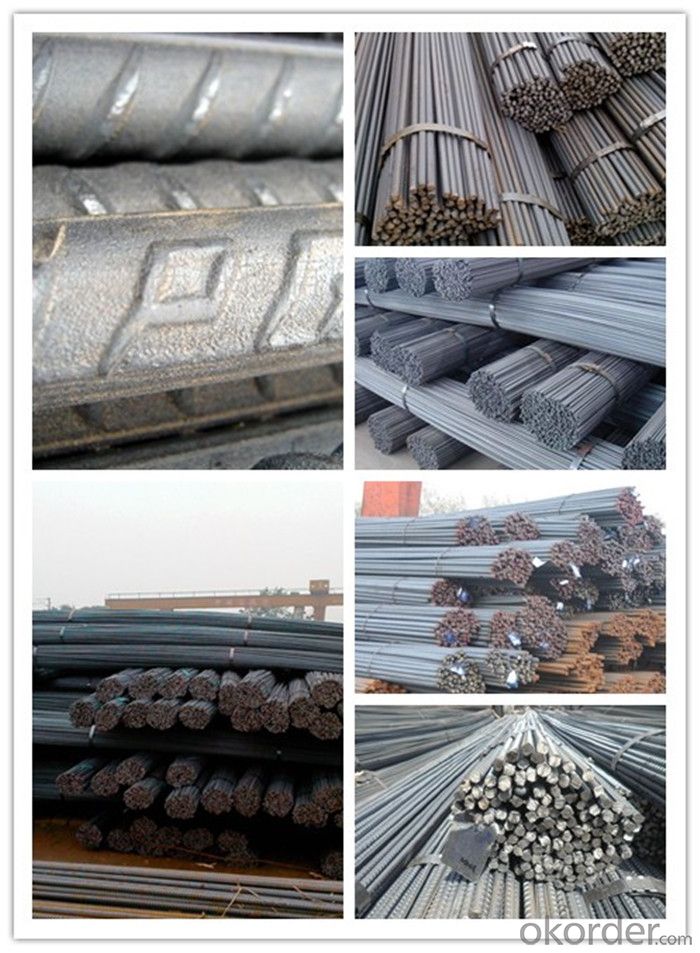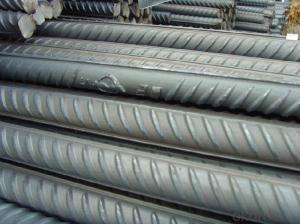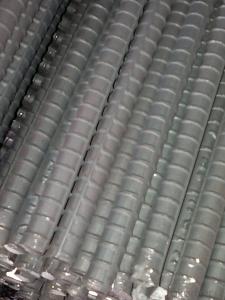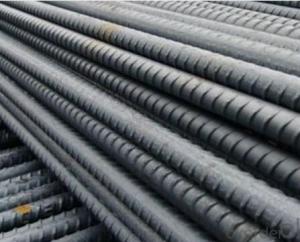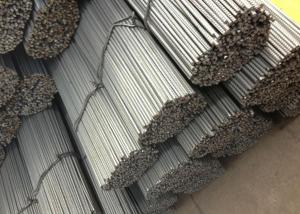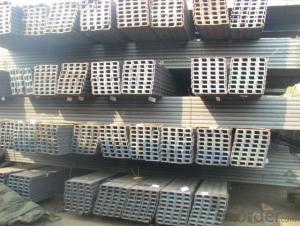Hot Rolled Steel Rebar and Cold Steel Rebar
- Loading Port:
- Tianjin
- Payment Terms:
- TT OR LC
- Min Order Qty:
- 100 m.t.
- Supply Capability:
- 50000 m.t./month
OKorder Service Pledge
OKorder Financial Service
You Might Also Like
Specification
Hot Rolled Steel Rebar and Cold Steel Rebar
Description of Hot Rolled Steel Rebar :
1, Diameter: 5.5mm-10mm rounds reinforcing steel bar
10m- 40mm Hot Rolled Steel Rebar
2, Length: 6m, 9m, 12m or customized
3, Standard: GB, ASTM, AISI, SAE, DIN, JIS, EN
OEM technology - send detailed technical parameters for accurate quotation.
2, Produce Process: smelt iron - EAF smelt billet - ESR smelt billet -
hot rolled or forged to get the steel round bar and plate
3, Heat Treatment: annealing, normalizing, tempering, quenching
4, Surface Treatment: Black
5, Quality Assurance: We accept third party inspection for all orders.
You can ask testing organizations such as SGS, BV, etc. to test our products before shipping.
Chemical Composition of Hot Rolled Steel Rebar :
Grade | Technical data of the original chemical composition(%) | |||||
Reinforcing steel bar HRB335 | C | Mn | Si | S | P | B |
≤0.25 | ≤1.60 | ≤0.80 | ≤0.045 | ≤0.045 | >0.0008 | |
Physics Capability | ||||||
Yield Strength(N/cm2) | Tensile Strength(N/cm2) | Elongation(%) | ||||
≥ 335 | ≥490 | ≥16 | ||||
Reinforcing steel bar HRB400 | C | Mn | Si | S | P | B |
≤0.25 | ≤0.16 | ≤0.80 | ≤0.045 | ≤0.045 | 0.04-0.12 | |
Physics Capability | ||||||
Yield Strength(N/cm2) | Tensile Strength(N/cm2) | Elongation(%) | ||||
≥ 400 | ≥ 570 | ≥ 14 | ||||
Product Show of Hot Rolled Steel Rebar :
Company Information:
CNBM International Corporation is the most important trading platform of CNBM group.
Whith its advantages, CNBM International are mainly concentrate on Cement, Glass, Iron and Steel, Ceramics industries and devotes herself for supplying high qulity series of refractories as well as technical consultancies and logistics solutions.

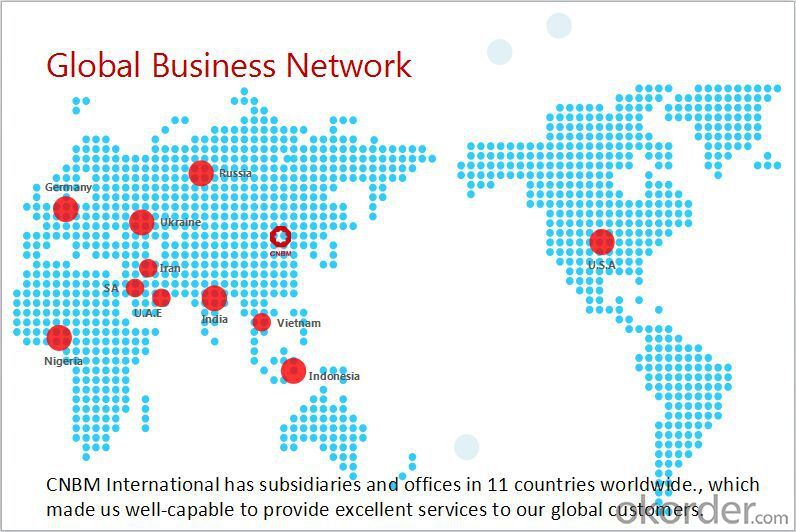
FAQ:
1, Your advantages?
professional products inquiry, products knowledge train (for agents), smooth goods delivery, excellent customer solution proposale
2, Test & Certificate?
SGS test is available, customer inspection before shipping is welcome, third party inspection is no problem
3, Factory or Trading Company?
CNBM is a trading company but we have so many protocol factories and CNBM works as a trading department of these factories. Also CNBM is the holding company of many factories.
4, Payment Terms?
30% TT as deposit and 70% before delivery.
Irrevocable L/C at sight.
5, Trading Terms?
EXW, FOB, CIF, FFR, CNF
6, After-sale Service?
CNBM provides the services and support you need for every step of our cooperation. We're the business partner you can trust.
For any problem, please kindly contact us at any your convenient time.
We'll reply you in our first priority within 24 hours.
- Q: What are the main applications of special steel in the power transmission industry?
- Special steel is widely used in the power transmission industry for various applications. One of the main applications is in the manufacturing of power transmission components such as gears, shafts, and couplings, where special steel's high strength and durability are essential for transmitting power efficiently. Additionally, special steel is also used in the construction of power transmission towers and poles, providing structural integrity and resistance against harsh environmental conditions. Overall, the main applications of special steel in the power transmission industry revolve around its ability to enhance performance, reliability, and longevity of power transmission systems.
- Q: What are the main characteristics of spring steel?
- Spring steel, which is specifically designed to possess excellent elasticity and resilience, is a type of high-carbon steel. Its notable property is that it can return to its original shape after being bent or deformed, making it ideal for applications that require repeated and controlled deflection. The key characteristics of spring steel include the following: 1. High Yield Strength: Spring steel demonstrates high yield strength, meaning it can withstand significant stress before permanent deformation occurs. This enables it to bear heavy loads and resist bending or breaking under pressure. 2. Exceptional Elasticity: An important feature of spring steel is its remarkable elasticity. It can be flexed, twisted, or stretched without permanent deformation, and once the force is released, it reverts back to its original shape. This property is crucial for applications that necessitate constant and repetitive motion. 3. Superior Fatigue Resistance: Spring steel has exceptional resistance to fatigue, allowing it to endure countless cycles of stress without failure. This characteristic is crucial for products subjected to continuous and repetitive loads, such as springs in automotive suspensions or industrial machinery. 4. Good Hardness and Wear Resistance: Spring steel is typically hardened to enhance its resistance to wear. This enables it to withstand abrasion and deformation under harsh conditions, making it suitable for applications involving friction or impact, such as cutting tools or automotive components. 5. Excellent Formability: Spring steel can be easily formed into various shapes and sizes, making it highly versatile for different applications. It can be cold-drawn, rolled, or heat-treated to achieve specific mechanical properties, allowing manufacturers to customize its characteristics based on their specific requirements. In conclusion, spring steel possesses high yield strength, exceptional elasticity, superior fatigue resistance, good hardness and wear resistance, and excellent formability. These qualities make it an essential material in various industries, including automotive, aerospace, construction, and manufacturing.
- Q: How is special steel used in the production of molds and dies?
- Special steel is used in the production of molds and dies due to its exceptional properties, such as high hardness, wear resistance, and heat resistance. These characteristics make it ideal for shaping and forming various materials, including metals and plastics. Special steel can withstand the high pressures and temperatures involved in the molding and die casting processes, ensuring durability and precision in the production of molds and dies.
- Q: How does electrical steel contribute to the production of transformers and motors?
- Electrical steel, also known as silicon steel, plays a crucial role in the production of transformers and motors. Its unique magnetic properties, such as high permeability and low core loss, allow for efficient energy transfer and reduced power losses. This material is specifically designed to enhance magnetic induction and minimize eddy currents, ensuring optimal performance in electrical machines. By using electrical steel in the core of transformers and motors, manufacturers can increase energy efficiency, improve power transmission, and reduce overall operational costs.
- Q: What are the different tooling grades of special steel?
- There are various tooling grades of special steel, each designed to fulfill specific requirements and applications. Some common tooling grades include high-speed steel (HSS), which is known for its excellent heat resistance and durability; carbide steel, which is extremely hard and suitable for cutting tools; and stainless steel, which offers corrosion resistance and is commonly used for precision tools. Other tooling grades may include alloy steel, tool steel, and die steel, among others, each tailored to different tooling needs.
- Q: What is the difference between special steel and regular steel?
- Special steel refers to steel that has been specially manufactured or treated to possess specific properties or characteristics that regular steel does not have. This can include higher strength, better corrosion resistance, improved ductility, or enhanced heat resistance. Regular steel, on the other hand, refers to the general classification of steel that is commonly produced and used in various applications without any specific modifications or unique attributes.
- Q: How does the hardness of special steel affect its machinability?
- The machinability of special steel is significantly influenced by its hardness. Generally, as the hardness of the steel increases, its machinability decreases. Machinability refers to how easily a material can be machined or shaped using various machining processes like cutting, drilling, or milling. Hardness denotes a material's resistance to indentation or scratching. It is typically measured using the Rockwell hardness scale or the Brinell hardness test. Special steel, known for its high strength and durability, usually possesses a higher hardness compared to other steel types. When machining special steel, encountering a harder material presents challenges for multiple reasons. Firstly, cutting harder materials requires greater cutting forces and generates more heat during the machining process, making them more difficult to cut. Consequently, this leads to increased tool wear and reduced tool life, resulting in higher production costs. Secondly, hard steel tends to have lower ductility and toughness, making it more susceptible to cracking or chipping during machining. As a consequence, poor surface finish, dimensional inaccuracies, and even component failure can occur. Furthermore, increased hardness in special steel also impacts chip formation. Harder materials tend to produce shorter and more segmented chips, which can cause problems with chip evacuation and tool clogging. This further hampers the machining process and affects overall productivity. To enhance the machinability of hard special steel, several strategies can be employed. Choosing appropriate cutting tools with specific geometries and coatings designed for hard materials is crucial. Additionally, optimizing cutting parameters such as cutting speed, feed rate, and depth of cut can help mitigate the negative effects of hardness on machinability. In conclusion, the hardness of special steel directly affects its machinability. As hardness increases, machinability decreases due to higher cutting forces, increased tool wear, reduced ductility, and chip formation challenges. However, by employing proper tool selection and optimizing cutting parameters, the machinability of hard special steel can be improved, enabling efficient and cost-effective machining processes.
- Q: What are the applications of special steel in the agriculture sector?
- Special steel has various applications in the agriculture sector due to its exceptional properties such as durability, corrosion resistance, and strength. It is used in the manufacturing of farm equipment and machinery like tractors, plows, harrows, and combine harvesters. Special steel is also utilized in the construction of storage silos, irrigation systems, and animal housing structures. Additionally, it is employed in the production of cutting tools and blades for efficient crop harvesting and maintenance.
- Q: What are the properties of boron steel?
- Boron steel, also known as boron-alloyed steel, possesses several key properties. It is renowned for its exceptional strength, hardness, and wear resistance. Boron steel exhibits excellent heat treatment response, allowing for improved mechanical properties such as increased hardness and tensile strength. Moreover, it offers good weldability and formability, making it suitable for various fabrication processes. Additionally, boron steel demonstrates high fatigue strength, enabling it to withstand repetitive loading without failure. Overall, these properties make boron steel a valuable material for applications requiring high strength and durability, such as automotive components and construction equipment.
- Q: What are the different high-pressure grades of special steel?
- There exist several distinct varieties of special steel that are designed to withstand high pressures, each possessing its own unique characteristics and uses. Some frequently employed high-pressure grades of special steel encompass the following: 1. 4130 steel: This particular grade of steel is renowned for its exceptional strength, toughness, and resistance to heat. It finds considerable application in the fabrication of high-pressure tubing and components for the oil and gas industry. 2. 4340 steel: Distinguished by its extraordinary strength and toughness, this grade of steel is commonly utilized in the production of critical components like high-pressure valves, gears, and other crucial parts in industries such as aerospace, defense, and automotive. 3. 316 stainless steel: Highly resistant to corrosion and boasting excellent high-temperature properties, this stainless steel grade is frequently employed in high-pressure scenarios like pipelines, heat exchangers, and pressure vessels within the chemical and petrochemical industries. 4. 17-4 PH stainless steel: Offering a combination of high strength, superb corrosion resistance, and good toughness, this stainless steel grade often finds application in high-pressure pump components, turbine blades, and other vital parts within industries like power generation and aerospace. 5. F22 steel: Classified as a low-alloy steel with remarkable high-temperature strength and exceptional resistance to creep, this grade of steel is commonly used in high-pressure and high-temperature environments such as boilers, pressure vessels, and piping systems found in power plants and refineries. The aforementioned examples represent just a small selection of the available high-pressure grades of special steel. The appropriate grade choice is contingent upon the specific requirements of the application, encompassing factors such as pressure, temperature, corrosion resistance, and mechanical properties.
Send your message to us
Hot Rolled Steel Rebar and Cold Steel Rebar
- Loading Port:
- Tianjin
- Payment Terms:
- TT OR LC
- Min Order Qty:
- 100 m.t.
- Supply Capability:
- 50000 m.t./month
OKorder Service Pledge
OKorder Financial Service
Similar products
Hot products
Hot Searches
Related keywords
